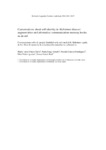Mostrar o rexistro simple do ítem
Conversations About Self-Identity in Alzheimer Disease: Augmentative and Alternative Communication Memory Books as an Aid
| dc.contributor.author | Gómez-Taibo, María-Luísa | |
| dc.contributor.author | Parga Amado, Paula | |
| dc.contributor.author | Canosa, Nereida | |
| dc.contributor.author | Vieiro Iglesias, Pilar | |
| dc.contributor.author | García-Real, Teresa J. | |
| dc.date.accessioned | 2018-05-08T11:07:43Z | |
| dc.date.available | 2018-05-08T11:07:43Z | |
| dc.date.issued | 2013-09-18 | |
| dc.identifier.citation | Gómez Taibo ML, Parga Amado P, Canosa Domínguez N, Vieiro Iglesais P, García Real T. Conversations about self-identity in Alzheimer disease: augmentative and alternative communication memory books as an aid. Rev Logo Foniatr Audiol. 2014;34(2):60-67 | es_ES |
| dc.identifier.issn | 0214-4603 | |
| dc.identifier.uri | http://hdl.handle.net/2183/20694 | |
| dc.description.abstract | [Abstract] Alzheimer disease (AD) is a progressive and degenerative neurological disorder that affects memory, language and communication, thinking, and social skills. The inability to recall incidents and events, especially when symptoms become more prevalent and severe, can cause a person to experience a loss of self or to have doubts about his or her identity. One approach to helping these patients with their memory and language problems is to use memory books, a kind of Augmentative and Alternative Communication (AAC) tool. The aim of this study was to verify whether the introduction of AAC books could have an impact on conversations about self-identity through an increase of ‘self’-positive conversational contents and on improving conversational skills. Three single case studies were carried out with three elderly women with mild, moderate and severe AD, respectively. Each participant was involved in a conversation about their ‘selves’ in an alternating treatment design (ABAB) without a memory book in phase A and with the aid of this AAC tool in phase B. The results showed a similar conversational response pattern in all participants. AAC aids increased the number of ‘self’-positive conversational statements with a reduction in negative, ambiguous and repetitive utterances. In conclusion, AAC memory tools seemed to help participants with dementia to focus their attention on relevant personal information, allowing them to centre the conversation on core positive identity contents, thus improving the quality of the conversations with fewer ambiguous utterances. | es_ES |
| dc.description.abstract | [Resumen] La Enfermedad de Alzheimer es una enfermedad neurológica degenerativa y progresiva que afecta a la memoria, el lenguaje y la comunicación, el pensamiento y las habilidades sociales. La incapacidad para recordar incidentes y acontecimientos, cuando los síntomas son más prevalentes y severos, puede causar que la persona experimente una pérdida del self o tenga dudas sobre su identidad. Un enfoque que ayuda con los problemas de memoria y de lenguaje es el uso de los libros de memoria, herramientas de Comunicación Aumentativa y Alternativa (CAA). El objetivo de este estudio es comprobar si la introducción de libros de CAA tiene un impacto en las conversaciones sobre la propia identidad, a través del incremento de contenidos conversacionales positivos sobre “si mismo”, y en la mejora de habilidades conversacionales. Se llevaron a cabo tres estudios de caso único con tres mujeres mayores con enfermedad de Alzheimer, leve, moderada y severa, respectivamente. Se implicó a cada participante en una conversación sobre “si misma” en un diseño de tratamientos alternos (ABAB) sin libro de memoria en la fase A y con apoyo de la CAA en B. Los resultados muestran un patrón de respuesta conversacional similar para las tres participantes. Con las ayudas de CAA se incrementaron las frases positivas sobre “si misma” en la conversación y se redujeron las declaraciones negativas, ambiguas y repetitivas. La conclusión es que parece que las herramientas de memoria han ayudado a enfocar la atención sobre información personal relevante, permitiendo centrar la conversación en contenidos básicos de su identidad y mejorando su calidad con menos ambigüedades. | es_ES |
| dc.language.iso | eng | es_ES |
| dc.publisher | Elsevier | es_ES |
| dc.relation.uri | https://doi.org/10.1016/j.rlfa.2013.04.008 | es_ES |
| dc.rights | Atribución-NoComercial-SinDerivadas 3.0 España | es_ES |
| dc.rights | © Asociación Española de Logopedia, Foniatría y Audiología | es_ES |
| dc.rights.uri | http://creativecommons.org/licenses/by-nc-nd/3.0/es/ | * |
| dc.subject | Augmentative and alternative communication | es_ES |
| dc.subject | Memory books | es_ES |
| dc.subject | Conversations | es_ES |
| dc.subject | Alzheimer disease | es_ES |
| dc.subject | Comunicación Aumentativa y Alternativa | es_ES |
| dc.subject | Libros de memoria | es_ES |
| dc.subject | Conversación | es_ES |
| dc.subject | Enfermedad de Alzheimer | es_ES |
| dc.title | Conversations About Self-Identity in Alzheimer Disease: Augmentative and Alternative Communication Memory Books as an Aid | es_ES |
| dc.title.alternative | Conversaciones sobre la propia identidad en la enfermedad de Alzheimer: ayuda de los libros de memoria de comunicación aumentativa y alternativa | es_ES |
| dc.type | info:eu-repo/semantics/article | es_ES |
| dc.rights.access | info:eu-repo/semantics/openAccess | es_ES |
| UDC.journalTitle | Revista de Logopedia, Foniatría y Audiología | es_ES |
| UDC.volume | 34 | es_ES |
| UDC.issue | 2 | es_ES |
| UDC.startPage | 60 | es_ES |
| UDC.endPage | 67 | es_ES |
Ficheiros no ítem
Este ítem aparece na(s) seguinte(s) colección(s)
-
GI-RNASA - Artigos [195]
-
GI-EILOE - Artigos [21]






